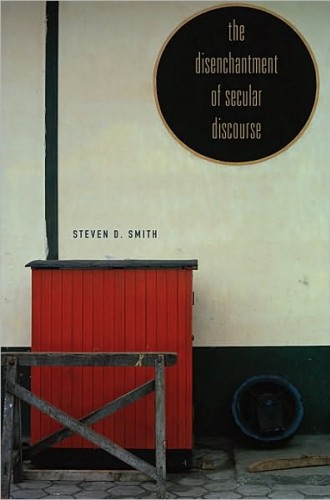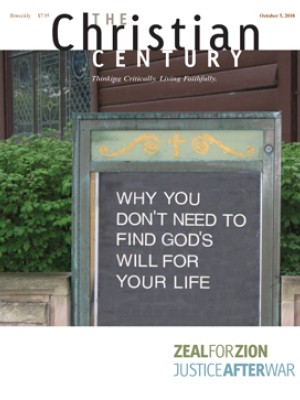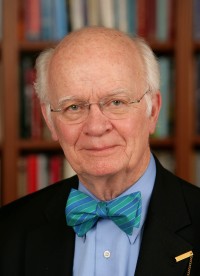A review of The Disenchantment of Secular Discourse
"No whining!" the plaque on my study wall all but shouts. Steven D. Smith does not whine as he invades a territory frequented by whiners. Some, whom he names secular rationalists, moan about the religious discourse that they regard as threatening. On the other hand, the religious who fear the secularists complain that secular discourse claims and possesses a near monopoly in the public world. Smith, a law professor at the University of San Diego, takes on but then transcends the whiners.
His weapon is argument, and his goal is eliciting a new openness on all hands, but especially on the part of the secularists, who tout reason and tend to unreflectively or calculatingly dismiss almost all expressions of religion in public. He argues with notables who can handle themselves, including John Rawls, Susan Jacoby, Richard Rorty and Martha Nussbaum, though I imagine that they will make future utterances with more care if they read Smith.
Read our latest issue or browse back issues.
At issue are the leading thinkers of the Enlightenment, especially in the American version embodied by many of the nation's founders. Deftly he shows how the most notable, Thomas Jefferson and James Madison, employed religious motifs and rationales. In fact, he points out, Madison lay explicitly theological foundations under the structure of constitutional frameworks. At the same time, Smith knows that we know how much the world has changed since the American founding, and he takes those changes seriously, as one must. He shows how Henry Steele Commager, a giant among historians of the Enlightenment and author of The Empire of Reason, believed that Reason ("notice . . . the upper case") would "solve all of those problems that pressed upon [us] so insistently"—a line that to Smith looks "quaint, almost childlike."
Despite the quaintness of many arguments based on uppercase Reason, they still are often taken for granted or militantly promoted, even though latter-day critics question many features of the Enlightenment. Most of all, and worst of all, the advocates of Reason would eliminate all religious discourse because, among other things, religion is a conversation stopper. But need it be? Can the advocates of Reason not envision alternatives? Smith is not sure, since, in Max Weber's terms, they experienced the world becoming "disenchanted"; they found themselves moving into what Weber called "the iron cage," and they have not been able to find a way out. Or they do not realize that they are in a cage.
Smith demonstrates that there are practical consequences when argument is replaced by soliloquy on the part of the Reason people in their cage. His case studies include issues such as "living and dying," where nature is putatively left to "take its course." Do the advocates of Reason ask, What is nature, and what is the course? When, in the name of reason, ethicists counsel medics and other people involved with care and justice to "do no harm," the cage bars prevent the advocates of Reason from envisioning what harm means.
Smith devotes a whole chapter to a delightfully ironic book of lectures by front-rank intellectual historian Carl Becker, who revisited the Enlightenment leaders who wanted to flatten out discourse and bring it down to earth. The title of Becker's 1931 book is The Heavenly City of the Eighteenth-Century Philosophers. Smith demonstrates that Becker himself, despite his insight, was also a captive of the iron cage. So are many who argue for the claims of science while dismissing the concerns religions set out to address.
If I have created the impression that Smith is being irrational, or is advocating sectarianism or theocracy, or resorts to defenses and expressions of religion against which Enlightenment figures necessarily and creatively warned, I have not been clear. Smith treats his subjects fairly while reading them carefully and turning up flaws many of them have overlooked.
Sometimes when I read the fashionable postmodern secularist critiques of the Enlightenment, I want to shout: "Stop! Where would we be without it?" Think of the admittedly mixed but genuine boons associated with the advocates and employers of freedom of thought, inquiry, religion and so much else. We shouldn't trash the Enlightenment without first sending cards of thanks and promising to build on it even while criticizing its defenders, be they "childlike" or bullying. Smith knows the limits of criticism.
And he doesn't yield the game to aggressive religionists who seek legal privileges or make arrogant claims for what they find in Revelation, which was the counter to Reason among many of the Enlightened. There is no hidden Christendom lurking behind Smith's analyses and suggestions. In fact, his proposals are so qualified, muted and cautiously presented that many readers might be frustrated. They might ask how someone who knows so much about the problem is so modest about the solutions, if there are any. Here is no "heavenly city" from which 21st-century thinkers favorable to religion can "solve all the problems."
Smith certainly is not asking, in Weber's terms, for a reenchantment of the world, and he is too intellectually modest or historically informed to wish away and expect the end of the "iron cages." He does something more practical, useful and promising: he offers "the seemingly bland recommendation of . . . openness" among all parties. That does seem and sound bland. Yet whoever has listened to thinkers who are grounded in reason and who—in a strategy Smith likes—"smuggle" now neglected elements of "purpose, spirit, transcendence, divinity" into the conversation can testify to the delights of communication and innovation.
"Smuggle?" "Open?" Smith asks in the last line of his book. Is that "the best we can do?" We will know only "if we open up the cage and see what happens."








